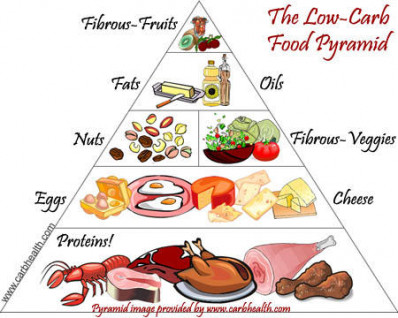~URGENT BULLETIN: We are now OPEN for business!~
By Geena Collins on
Welcome to Your Health & Wellness Update, May 2020
Expertise ~ Support ~ Results
Click below to view:
~Urgent Bulletin: We are now OPEN for business!~
With our very best intentions to keeping us all COVID-19 free,
John, Paddy, and Pauline.
Read more
Newsletter, April 2020
By Geena Collins-Oldham on Apr 27, 2020
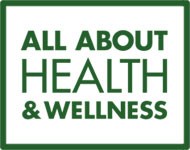

Expertise ~ Support ~ Results
Dear Valued Patients,
We hope that you are all doing okay in this very unusual time.
Your ongoing optimal health and wellness is very important to us, and especially so during the weeks ahead.
In Alert Level's 4 & 3, we are able to provide telehealth consults using Skype, Zoom, or by phone, with John or Paddy.
Please call us on 0800 200 299, or email us at enquiry@allabouthealth.co.nz, to book in a consultation with us, order prescriptions, and/or get some free exercise advice from John.
We would like to thank you for your support and understanding during this time, and we look forward to recommencing our face-to-face consults once we are allowed, hopefully at Alert Level 2.
John, Paddy, and Pauline.
_______________________________________________________________________________________________________________

_______________________________________________________________________________________________________________

Copyright © |2020|*|ALL ABOUT HEALTH & WELLNESS|*, All rights reserved.
Read more
All About Health and Wellness Newsletter - May 2019
By Health and Wellness on May 31, 2019
|
Read more
Specialised Golf Training Now Available!
By Patricia Sullivan on Nov 16, 2017
Yes, we now offer specialised golf training!

To find out more about this, as well as some other fantastic information from the All About Health and Wellness Team - including a special Christmas offer - follow the link below!
Click here to read our November 2017 newsletter.

Merry Christmas!
Read more
Welcome To Your Health and Wellness ~ Christmas, 2018
By Patricia Sullivan on Dec 20, 2018

Our Christmas Hours are: Closing 12.00pm (Midday) on 22nd December 2018 Reopening 7th January 2019
We hope the information below will give you a much wealthier insight to the services All About Health and Wellness can offer to aid you in achieving your best self through great health by natural means, as well as some helpful information about hormones and how to achieve balance. With a better insight comes better judgement when choosing the right foods and supplements to feed your body to keep you healthy and well.
We'd like to wish you all a very Merry Christmas, and a Happy New Year!
We look forward to seeing you soon,
John, Paddy, Donna, Ali, Pauline, and Kate.
__________________________________________________________________________________________________
Attention Golfers!

Do you have a golf-related injury? John can help!
25% of all golf injuries involve the lower back, which is hardly surprising when the forces generated into your lower back on impact of the ball are equal to 8 times your body weight! You don't want any injury, but especially a lower back injury, stop you from playing and enjoying golf, which is where I come in, as I can help at 2 levels; 1. Optimistically, preventing the injury from occurring, and 2. Treating the injury should you have the misfortune to receive one. In 2017, I completed my Golf Bio Mechanics Certification with the Titleist Performance Institute in the UK. I learned how to assess your flexibility, strength and balance in areas that have direct relevance to golf. And, by improving your capabilities in these areas, not only do you reduce your chance of injury, but you'll improve your game as well. This assessment process takes 45 minutes, including my advice and remedies to some of the issues you may have. __________________________________________________________________________________________________
Pregnancy Supplements

Excerpt from Metagenics
Vitamin D for Baby's Development
Pregnancy is often described as a ‘window of opportunity.’ As a mother, being in the best of health before and during pregnancy can help influence critical stages of your baby’s development and help create a happy and healthy child. One of these key opportunities is ensuring that you have adequate vitamin D levels to pass onto your child. It is important for mums to have good vitamin D levels in pregnancy, as low prenatal vitamin D levels have been linked to many childhood challenges, such as asthma and allergies, as well as autism, behavioural issues and metabolic effects. On the bright side, adequate vitamin D levels have been found to benefit your child in many ways, improving health and development.< /br> Why Vitamin D? 1. Better Brains and Behaviour Vitamin D is essential for protecting your child’s brain and nervous system, and will assist with learning and behaviour. Low levels have been linked to developmental delays and autism. Interestingly, research has shown that babies conceived during winter are more likely to develop autism than those conceived in summer. This is thought to be due to mum having less exposure to sunlight and consequently, lower vitamin D levels in the colder, darker months. Boost your vitamin D levels to boost your child’s potential! 2. Boost Your Baby's Immune System Prenatal vitamin D deficiency can compromise your little one’s immune system, contributing to asthma, allergies and poor immunity. Even when your baby is in utero, vitamin D plays an important role in helping the lungs develop. Throughout childhood, vitamin D also helps to regulate the immune system, to help you have healthier, happier kids. 3. Lower Your Baby's Risk of Cardiovascular Disease A low vitamin D status through pregnancy has also been linked to an increased risk of cardiovascular disease and type 2 diabetes for the child in later life, possibly linked to factors such as obesity and poor blood glucose control. Protect your child’s heart and metabolic health by looking after your own D levels in pregnancy. Guidelines for Optimal Vitamin D Levels The following tips can help pregnant mothers maintain optimal vitamin D levels:
- Aim for 6 to 7 minutes of sun exposure mid-morning or mid-afternoon during warmer months, and 7 to 40 minutes at noon during winter; ideally arms and shoulders should be visible and free of sunscreen.
- If you are low in vitamin D (and/or you wish to avoid the sun), your Practitioner may recommend vitamin D to quickly and safely build up your vitamin D stores.
Acid Reflux Relief

Excerpt from Baseline of Health Foundation
Changing Your Diet's Better Than Drugs for Acid Reflux If you’ve got acid reflux, you may come to dread the time of night when you are a couple of hours past eating dinner—that feeling of pain that arises in your chest or throat, sometimes accompanied by a burning sensation and bitter taste in your mouth. In fact, it’s that persistent discomfort after dining that probably caused you to visit the doctor for a prescription to get some relief. But you may want to get rid of those potentially deadly medications, because new research suggests alleviating your acid reflux may be as simple as improving your diet. It is almost astounding that dietary changes wouldn’t be everyone’s first line of defense against reflux. First of all, the Mediterranean diet is an all-around great choice that has been linked to other health benefits including lowering the risk of heart disease, cancer, Alzheimer’s, and diabetes. And second of all, PPIs are often ineffective and potentially dangerous. What’s more, even when they do work, PPIs simply prevent the release of stomach acid, suppressing a symptom rather than addressing its cause. PPIs were found to increase your risk of cancer, heart disease, and a host of other problems. In other words, if you are one of the millions of people diagnosed with reflux, make a lifestyle change through diet and leave behind the PPIs for better overall health as well as relief from the condition. And you might want to consider taking digestive enzymes with your meals since that actually encourages your body to produce less stomach acid. To read the study conducted, visit the original article on the Baseline of Health Foundation website here. __________________________________________________________________________________________________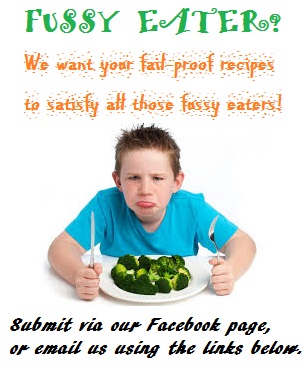 __________________________________________________________________________________________________
__________________________________________________________________________________________________
Want help to better your golf game with John? Or, would you like some physiotherapy with Donna?
Book your consult with us below - we'd love to help!

Or, call us on 0800 200 299.
__________________________________________________________________________________________________
SPECIAL - 20% Discount Metagenics NasoClear
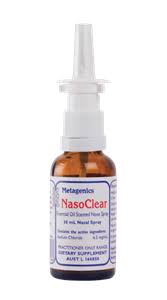
We have extended our deal for December, offering our fantastic Metagenics NasoClear for a 20% discount at just $14.90. It has essential oils to reduce inflammation and infection.
We also have a fantastic homeopathic remedy to help reduce (de-sensitise) you to spring allergies, including dust mites and animal dander, with a 20% discount for December - contact us on 0800 200 299.
__________________________________________________________________________________________________
As always, if you have questions or would like to find a time to come in to talk to Paddy, John, Kate, Ali, or Donna, you can enquire online or call us on 0800 200 299.
In the meantime, have a great month, and Healthy Regards,
John & Paddy.
Read more
Welcome To Your Health and Wellness ~ August, 2018
By Patricia Sullivan on Aug 15, 2018


Welcome to your health & wellness Expertise ~ Support ~ Results
We're sorry we didn't get a newsletter out in July - Paddy has been incredibly busy with her ongoing advocacy work to raise awareness about surgical mesh, as a co-founder of 'Mesh Down Under', along with her commitments to the Ministry of Health Mesh Working Group which currently includes work on the development of robust inform consent for women undergoing Gynaecological surgery. Check out Paddy's interview on Nine to Noon last Tuesday here.
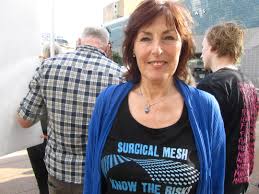
If you're interested to learn more about surgical "innovations" like surgical mesh and the "devastating consequences" they could potentially have for patients, with stories from people who have lived, or are living, a nightmare caused by a medical device which was meant to better their health but instead worsened it, have a look at this excellent documentary on Netflix - 'The Bleeding Edge' (Rating: R16+).Synopsis: "This eye-opening look at the fast-growing medical device industry reveals how the rush to innovate can lead to devastating consequences for patients."__________________________________________________________________________________________________
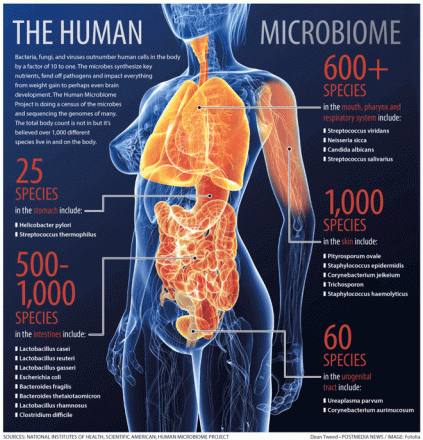
Image Source: The Mind Body Shift / Originally Sourced by The Mind Body Shift from: Eat Like Lisa
This month, we're going to be looking at "5 Ways You Might Upset Your Gut Microbiome and What to Do About It"; ‘smart DNA’ microbiome testing; and our 10% discount on our stocked Metagenics probiotic product for the month of August! We hope the information below will give you a much wealthier insight to good gut health, including information about microbiomes; what they are, how you can test them and how you can supplement to ensure the best microbiome health, which we come across in both natural and man-made products (supplements). With a better insight comes better judgement when choosing the right foods and supplements to feed your body to keep you healthy and well. Additionally, we still have our Vitamin C powder on special, with a 20% discount!
We look forward to seeing you soon,
John, Paddy, Ali, Pauline, and Janet.
__________________________________________________________________________________________________
5 Ways You Might Upset Your Gut Microbiome, and What To Do About It
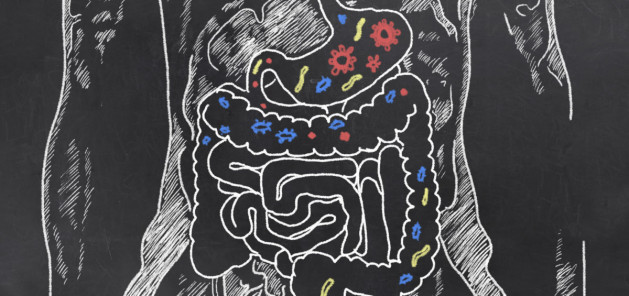
A featured piece by Metagenics.
Did You Know... We Offer 'smartDNA' Testing?
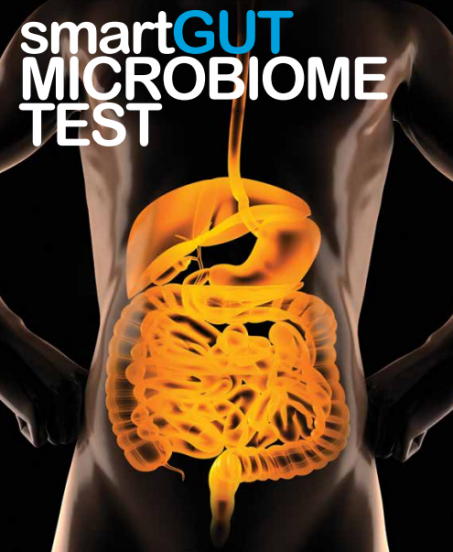
We offer 'smartDNA' testing in the form of the 'smartGUT' microbiome tests.
What is the smartGUT microbiome analysis? The smartGUT microbiome analysis gives you access to leading edge DNA sequencing technology.What is Metagenomic Analysis?
The bacteria present in our gut, mouth, skin and other sites in the human body are often referred to collectively as the human Microbiome or “second genome”. Composed of more than a 100 trillion microorganisms the human microbiome outnumbers the total number of human genes by a factor of a hundred to one. This means, for every gene in your genome there are 100 bacterial genes. Genomic technology now has the capacity to view this second genome by sequencing specific regions or variable regions in the bacterial genome. It is these variable regions that enable bacteria to be identified down to species level. Each bacterial species has a unique “finger print”. This means that the analysis is similar to a crime scene investigation. If the sequence is detected then that particular bacteria is present in your gut.What Can I Expect From The Test? Do you experience:- Bloating
- Chronic Fatigue
- Diahorea
- Depression
- Weight Gain
- Skin Conditions

The probiotic product, Ultra Flora Restore 30 VegeCaps (normal and dairy free), by Metagenics is a dietary supplement said to assist with many health problems, but especially with gut health, with over 24 billion live good bacteria.
Probiotics help to restore good gut health, especially important if you've come to us for the smartGUT test and the results showed you need to give your gut some TLC. So, this month, we've got a SPECIAL OFFER on these products!
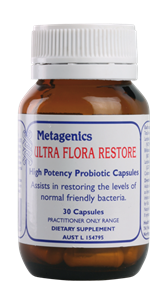
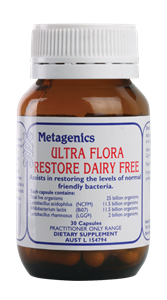
SPECIAL OFFER!! Ultra Flora Restore 30 VegeCaps (normal, or dairy free)
We are giving you a 10% discount on these two products for the month of August!
Want help to better your diet to include more foods which assist with good gut health? Or, do you want to see how your gut is functioning with a smartGUT test?
Book your consult with us here, or phone 0800 200 299 - we'd love to help!
__________________________________________________________________________________________________Naturopathic Vitamin C Powder

We are still offering our fantastic Naturopathic high dose Vitamin C powder (including immune boosting zinc + those crucial bio-flavenoids) for a 20% discount at just $36.00 for 200 gms Ingredients - Each 5 ml metric teaspoon contains at least: Total Vitamin C per serve --------- 2.96g (2960mgs) Ascorbic Acid ------------------------ 2280mg Calcium Ascorbate ----------------- 308mg Magnesium Ascorbate ------------- 794mg Lemon Bioflavonoids --------------- 1084mg d-alpha-Tocopherol succinate ---- 131mg(equivalent to Vit E 152 IU) Beta-carotene (natural) ------------- 37mg (equivalent to Beta-carotene 2.8mg) Zinc amino acid chelate ------------ 28mg (equivalent to Zinc 5.6mg) Natural Orange flavour ------------- 505mg Citric acid ------------------------------ 393mg Sodium bicarbonate ----------------- 187mg Stevia rebaudiana -------------------- 252mg This product contains NO Yeast, Wheat, Milk/Dairy, Artificial Colour, Artificial Preservatives, Artificial Flavourings or Sugar.
__________________________________________________________________________________________________________
As always, if you have questions or would like to find a time to come in to talk to Paddy, John or Ali, you can enquire online or call us on 0800 200 299.
In the meantime, have a great month, and Healthy Regards,
John, Paddy, Ali, Pauline, and Janet.
Read more
Welcome To Your Health & Wellness ~ June, 2018
By Patricia Sullivan on Jun 8, 2018


Welcome to your health & wellness Expertise ~ Support ~ Results
This month, we're going to be looking at superfoods and how they can help you survive; how iodine can help your osteoporosis and increase your bone health, as well as assist you in maintaining a healthy thyroid and support you through a healthy pregnancy; and how CoQ10 could be your new best friend - especially with our 10% discount on our stocked product for the month of June!
We hope the information contained in this month's newsletter will give you a much wealthier insight to the benefits of different supplements, which we come across in both natural and man-made products. With a better insight comes better judgement when choosing the right foods to keep you both healthy and well.
Additionally, we still have our Vitamin C powder on special, with a 20% discount!
We look forward to seeing you soon,
Paddy, John and the All About Health & Wellness team.
Happy Birthday To .... US!

That's right, it's our birthday!
On Queen's Birthday weekend 10-years-ago, we first launched All About Health & Wellness in Crofton Downs shopping mall. Wow, doesn't time just zip by!
TRIGGER WARNING: The article contained in June's newsletter discusses serious health challenges, of which you or your friends or family may be a survivor or current patient of. 
Please consider this before clicking on the link below to view our June newsletter.
To view our June newsletter, please click here.
As always, if you have questions or would like to find a time to come in to talk to Paddy, John or Ali, you can enquire online or call us on 0800 200 299.
In the meantime, have a great month, and Healthy Regards,
John & Paddy.
Read more
Merry Christmas from the All About Health & Wellness Team
By Patricia Sullivan on Dec 19, 2017

Thank you for entrusting us with improving your health and wellness, and we wish you and your families happy and healthy times over this special time. Remember to enjoy and relax, with lots of love and laughter.
Please see below for our Opening Hours over the holiday season, including order dates to ensure you don't miss out.
Have a very Merry Christmas and a wonderful New Year. We look forward to connecting with you again next year.
Healthy regards,
John, Paddy, Pauline, Janet, and Emily.

We close on Friday 22nd December 2017 and return on Monday 8th January 2018.
Please place all orders TODAY (Tuesday 19th December 2017) for delivery by Friday 22nd December 2017, or let us know and we can organise that you order direct from the supplier whilst we are unavailable.
We apologise for the late notice.

As always, if you have questions or would like to find a time to come in to talk to Paddy, John or Ali, you can click here to enquire online or call us on 0800 200 299.
In the meantime, have a great month.
Healthy regards,
John & Paddy.
Read more
Stay Well This Winter!
By Patricia Sullivan on May 30, 2017
Every winter when you get sick, do you tell yourself to be more prepared next year? As soon as someone sneezes do you find yourself with yet another cold or flu?
Don't worry! It doesn't have to be that way! Get prepared this cold and flu season. Reduce your risk of getting sick by building strong immune defences. If you do get sick, a strong immune system will also reduce the severity of your cold and flu symptoms, and help speed your recovery.
Read our newsletter for our tips on how to stay well...............

Read more
Food as Fuel
By John Haywood on Dec 7, 2016

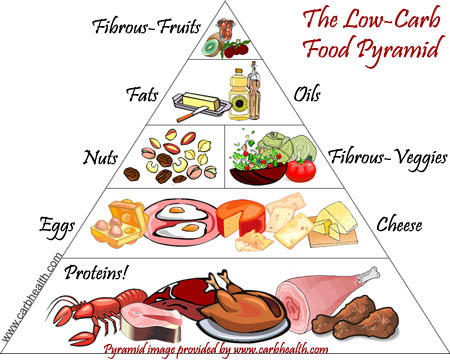
Read more
Calorie counting is a waste of time.
By Paddy Sullivan on Sep 21, 2016
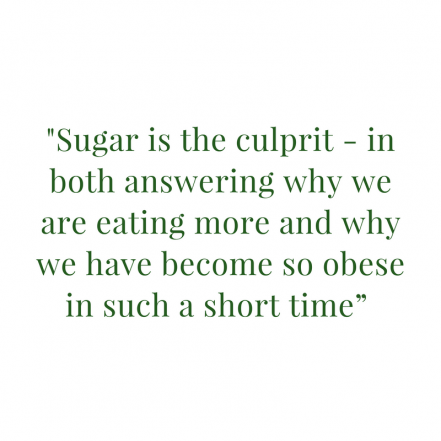
 (With 15 teaspoons of sugar, one bottle of Coke will put you over the suggested daily limit and, worse still, any sugar that isn't used by the body will be stored as fat.) Sugar is made up of two molecules – glucose and fructose. Glucose is the energy of life; fructose is something altogether different. In Dr Lustig’s words, “fructose is a poison. It’s nothing to do with calories, it’s a poison in itself”. How the liver processes fructose is different from how it processes glucose. With glucose, 20 per cent is processed in the liver and 80 per cent is used in other parts of the body, for example the muscles, brain and other organs. However, with fructose, 100 per cent is metabolised in the liver. When that happens, the liver (which is dealing with a toxin) reacts by increasing insulin resistance. This is bad as the pancreas then has to work over-time and the end point is that the by-product is converted to fat that is stored around the organs. This never used to be the case. It is only because we now have so many more foods with a high level of sugar – therefore fructose – that insulin resistance then occurs. Yes, fructose is the culprit, but it’s not that simple. There are hormones at play. Ghrelin is the hormone that sends the message we are hungry (grumbling ghrelin!). Leptin is the hormone, stored in fat cells, that sends a signal to the brain to say you have eaten a sufficient amount. But, the big problem is that when insulin levels are out of whack or insulin resistant (thanks to fructose) that alters the leptin’s response. So the brain still thinks you are hungry… and you eat more.
(With 15 teaspoons of sugar, one bottle of Coke will put you over the suggested daily limit and, worse still, any sugar that isn't used by the body will be stored as fat.) Sugar is made up of two molecules – glucose and fructose. Glucose is the energy of life; fructose is something altogether different. In Dr Lustig’s words, “fructose is a poison. It’s nothing to do with calories, it’s a poison in itself”. How the liver processes fructose is different from how it processes glucose. With glucose, 20 per cent is processed in the liver and 80 per cent is used in other parts of the body, for example the muscles, brain and other organs. However, with fructose, 100 per cent is metabolised in the liver. When that happens, the liver (which is dealing with a toxin) reacts by increasing insulin resistance. This is bad as the pancreas then has to work over-time and the end point is that the by-product is converted to fat that is stored around the organs. This never used to be the case. It is only because we now have so many more foods with a high level of sugar – therefore fructose – that insulin resistance then occurs. Yes, fructose is the culprit, but it’s not that simple. There are hormones at play. Ghrelin is the hormone that sends the message we are hungry (grumbling ghrelin!). Leptin is the hormone, stored in fat cells, that sends a signal to the brain to say you have eaten a sufficient amount. But, the big problem is that when insulin levels are out of whack or insulin resistant (thanks to fructose) that alters the leptin’s response. So the brain still thinks you are hungry… and you eat more. As Dr Lustig says….”We are eating more than we did 20 years ago because our leptin is not working as effectively. There is something wrong with our biochemical negative feedback system that normally controls our energy balance.” The reason our leptin isn’t working and the reason we can’t stay energy stable is because of the increased introduction of the fructose poison in our diets.
As Dr Lustig says….”We are eating more than we did 20 years ago because our leptin is not working as effectively. There is something wrong with our biochemical negative feedback system that normally controls our energy balance.” The reason our leptin isn’t working and the reason we can’t stay energy stable is because of the increased introduction of the fructose poison in our diets. Here’s what we know about fructose in relation to dietary hormones: * Fructose does not suppress ghrelin – the hunger hormone * Acute fructose ingestion does not stimulate insulin. Insulin does not go up and if insulin doesn’t go up then leptin doesn’t go up and if leptin doesn’t go up then your brain doesn’t see that you ate something. Therefore you eat more. So, back to that calorie counting mind set. You may reduce your calorie intake to 500 calories a day and think you will be OK. But, ask yourself, what type of 500 calories are you eating? You may have cut down on your calories – you may even be exercising more – but remember, your liver deals with various calories in different ways. De-bunking 30 years of dietary belief is a big deal and may take a bit of getting your head around. Come and see Paddy who will help you test some of your dietary calculations, and assist you in creating a diet with a fructose diminished focus.
Here’s what we know about fructose in relation to dietary hormones: * Fructose does not suppress ghrelin – the hunger hormone * Acute fructose ingestion does not stimulate insulin. Insulin does not go up and if insulin doesn’t go up then leptin doesn’t go up and if leptin doesn’t go up then your brain doesn’t see that you ate something. Therefore you eat more. So, back to that calorie counting mind set. You may reduce your calorie intake to 500 calories a day and think you will be OK. But, ask yourself, what type of 500 calories are you eating? You may have cut down on your calories – you may even be exercising more – but remember, your liver deals with various calories in different ways. De-bunking 30 years of dietary belief is a big deal and may take a bit of getting your head around. Come and see Paddy who will help you test some of your dietary calculations, and assist you in creating a diet with a fructose diminished focus. Come to the clinic for advice around how to eat, what to eat, why we may overeat, and for hormone supplement advice. How to eat covers, for example, chewing your food and not drinking water with your meal (so you don’t dilute stomach acid so it can breakdown your food). What to eat will cover both portion size and content. We can also assist with identifying the emotional issues behind overeating and ensuring you are truly congruent with losing weight at a sub conscious level. Further to that, we can advise in regards to the hormone supplements that can be taken to assist the weight loss process. Also of note: while we say exercise is not the answer to calorie counting, it is still important. Exercise reduces stress, it helps bring insulin levels down, and it detoxifies fructose.
Come to the clinic for advice around how to eat, what to eat, why we may overeat, and for hormone supplement advice. How to eat covers, for example, chewing your food and not drinking water with your meal (so you don’t dilute stomach acid so it can breakdown your food). What to eat will cover both portion size and content. We can also assist with identifying the emotional issues behind overeating and ensuring you are truly congruent with losing weight at a sub conscious level. Further to that, we can advise in regards to the hormone supplements that can be taken to assist the weight loss process. Also of note: while we say exercise is not the answer to calorie counting, it is still important. Exercise reduces stress, it helps bring insulin levels down, and it detoxifies fructose.Read more
No more truth tripping over the glucose and cancer relationship
By Paddy Sullivan on Aug 2, 2016
 This book, by science writer Travis Christofferson, illuminates a hugely interesting viewpoint on cancer treatment. Part of this perspective is based on starving cancer cells of their primary fuel – namely glucose. I am sharing my appreciation of this book’s messaging as it is a nice segue from my last blog with its focus on the ketogenic diet. As discussed, a ketogenic diet is heavily restrictive on sugar intake. Christofferson’s book is the best thing I have read in a long time. Here is someone who has had a thorough look at the causes of cancer – a topic which is still hugely researched and debated. There are essentially two schools of thought around this. One has attached importance to genetics, the other school of thought attaches itself to metabolic matters. Christofferson is a champion of the latter. He challenges everything we thought we knew about cancer, suggesting the reason for the failed war against this disease actually stems from a flawed paradigm that categorises cancer as an exclusively genetic disease. Tripping Over the Truth explores the non-toxic therapies born from the metabolic theory of cancer. Metabolic therapies highlight one striking feature in particular, I find – the potential to treat all types of cancer because they exploit the one weakness common to every cancer cell: dysfunctional metabolism. My take on this is as follows. Diet plays a key role in cancer treatment and prevention. If glucose is recognised as a primary fuel for cancer, then it makes good sense to look at a keto diet, in which glucose has no place. This is a low-carb, moderate protein, and high fat diet. Shift your metabolism from relying mostly on glucose for fuel, to relying mostly on fat-based sources of fuel. You will push your body’s metabolism into ketosis, which is a good thing. When you adapt your diet accordingly, your body gets better at burning and utilising fats as a primary energy source. Fat is an important source of essential fatty acids and nutrients, and fat with protein helps moderate the insulin response. This is a hugely desirable outcome, as cancer cells thrive so much on glucose.
This book, by science writer Travis Christofferson, illuminates a hugely interesting viewpoint on cancer treatment. Part of this perspective is based on starving cancer cells of their primary fuel – namely glucose. I am sharing my appreciation of this book’s messaging as it is a nice segue from my last blog with its focus on the ketogenic diet. As discussed, a ketogenic diet is heavily restrictive on sugar intake. Christofferson’s book is the best thing I have read in a long time. Here is someone who has had a thorough look at the causes of cancer – a topic which is still hugely researched and debated. There are essentially two schools of thought around this. One has attached importance to genetics, the other school of thought attaches itself to metabolic matters. Christofferson is a champion of the latter. He challenges everything we thought we knew about cancer, suggesting the reason for the failed war against this disease actually stems from a flawed paradigm that categorises cancer as an exclusively genetic disease. Tripping Over the Truth explores the non-toxic therapies born from the metabolic theory of cancer. Metabolic therapies highlight one striking feature in particular, I find – the potential to treat all types of cancer because they exploit the one weakness common to every cancer cell: dysfunctional metabolism. My take on this is as follows. Diet plays a key role in cancer treatment and prevention. If glucose is recognised as a primary fuel for cancer, then it makes good sense to look at a keto diet, in which glucose has no place. This is a low-carb, moderate protein, and high fat diet. Shift your metabolism from relying mostly on glucose for fuel, to relying mostly on fat-based sources of fuel. You will push your body’s metabolism into ketosis, which is a good thing. When you adapt your diet accordingly, your body gets better at burning and utilising fats as a primary energy source. Fat is an important source of essential fatty acids and nutrients, and fat with protein helps moderate the insulin response. This is a hugely desirable outcome, as cancer cells thrive so much on glucose.

Read more
Flipping the Food Pyramid
By John Haywood on Aug 2, 2016
It’s time to stop vilifying the fats, and let’s debunk some carbohydrate myths while we are at it!
Fats, proteins and carbohydrates will be key characters in this column as we discuss how best to fuel your muscles and your exercise in general. It may well be time to look at changing your fuel source for your exercise…and for general health benefits too, including weight loss. Traditionally, the belief has held that when we exercise, the major source of our fuel should be carbohydrates. This was a strongly held belief that has been prescribed for the best part of 40 years. Now we are saying, “hang on, that isn’t quite the way”. In a similar way we were told that eating fats was linked to cardio and blood pressure issues. Fats were vilified and carbohydrates were lauded. It’s time to get the facts right.Flipping the food pyramid
In reality, the traditional food pyramid we have operated by for far too long can be turned upside down. That pyramid has breads, cereal, rice and pasta at the bottom in the “eat plenty of” category, and fats at the top in the “use sparingly” zone. Things change. What we now know is that we store more fat in our body than we do carbohydrates (glycogen). Essentially, we are now acknowledging that the fat tank provides equal, if not better, benefits. What we need to do is get our body to burn and use the fat tank, not the carbohydrate/glycogen tank. Keto adaptation is the official term for this and is the most efficient path to accelerated fat burning. In short: a keto adapted diet is one that has low carbohydrate intake and higher levels of good fats and protein.What is Keto adaptation then?
This is the process of shifting your metabolism from relying mostly on glucose for fuel, to relying mostly on fat-based sources of fuel. Not only does fat oxidation increase, but your body will start producing enough ketones. They can be used as a significant source of fuel as well. Ketones are derived from partially metabolized fat, and they can be used in many of the same tissues of the body as glucose can, including the brain. The benefits of using fat and ketones rather than glucose for fuel are many. Fat is an important source of essential fatty acids and nutrients. Moreover, ingesting fat with protein helps to moderate the insulin response. A keto diet is a low-carb, moderate protein, and a high fat diet. How do you know if you are burning fat? Your body goes into a state called ketosis. This can be measured with a quick dipstick into your urine. This will tell you when you are fat burning. Insulin is a critical part of the whole equation, and this is, essentially, what causes problems. When we are on a high carbohydrate diet we end up producing and having altered insulin and this inhibits fat burning. Here’s an analogy. If you light a fire you use twigs to ensure it burns fast and hard. The twigs are carbohydrates. If you want a fire for a good barbeque you have to put charcoal on. Charcoal is the fat in this equation. We are teaching the body how to go from burning the twigs to the charcoal.
- Carbohydrate-based fueling is a self-perpetuating cycle: it runs out quickly, and every time you eat more carbs you delay adaptation to fat-burning.
- Fat-based fueling is sustainable, because it allows access to a very large store of energy without you frequently stopping to refuel. Blood sugar is maintained though precise internal processes without wild swings. These two together create a desirable flow of even, stable energy, mood, and alertness.
It takes time for our metabolism to adjust to dietary change
So, if we reduce carbohydrates in our diet, we reduce insulin levels and with this comes an increased ability to burn fat. But, this doesn’t happen in a day. It takes time for the metabolism to adjust to producing and using ketones at a significant rate – you may feel a bit slow during the change-over. Even though changes are evident within days of carbohydrate restriction, improvements continue for weeks. We recommend committing to a very low level of carbohydrate intake, and staying with it consistently for at least long enough to get ketone production in full force – about thirty days. Remember, you can measure this in your urine. We have the urine sticks to measure this by. Rest assured, if you experience any discomfort at all, you are likely to feel fully functional within 4 or 5 days. However, metabolic changes continue for at least two weeks and often more.The individual touch – we’re here to help
Unfortunately results can vary from individual to individual. Paddy and I are here to provide assistance and help you gain maximum advantage from this positive paradigm shift. I am here to talk about exercise your muscles will thrive from, and how your performance will be better on this recommended type of fuel source. Paddy can offer expert advice on how to make this adaptation easier and incredibly effective – all backed by the latest science. She will also be able to discuss keto diets and assist with the weight loss benefits to this.Read more
Welcome To Your Health and Wellness ~ February, 2019
By on Feb 1, 2019
Welcome To Your Health and Wellness ~ February, 2019


Welcome to your health & wellness
Expertise ~ Support ~ Results
Welcome back to your health & wellness digest, and a brand new year of 2019. We hope you had a relaxing, healthy and love-filled holiday season. We’re well-rested and back on deck to help you attain, regain or maintain your optimum health & wellness this year.
Please feel free to share these newsletters with your friends, family and colleagues, and help them gain further insight to their health & wellness, too.
This month, we’ll be talking about hormones, especially the tests we can perform to see if your hormones are behaving as they should. To help you find your hormonal balance, and save your bank account from its own unbalance after Christmas, we’re offering a 20% discount off these tests*. *T’s and C’s Apply.
We hope the information below will give you a much wealthier insight to the services All About Health and Wellness can offer to aid you in achieving your best self through great health by natural means, as well as some helpful information about hormones and how to achieve balance.
With a better insight comes better judgement when choosing the right foods and supplements to feed your body to keep you healthy and well.
We look forward to seeing you soon,
John, Paddy, Donna, Pauline, Ali, and Kate.
__________________________________________________________________________________________________
Comprehensive Hormone Testing

Check out the comprehensive hormonal testing we offer
You may be suffering from hormonal problems – they’re more common than you think.
Conditions such as hirsutism (excessive body hair in men and women on parts of the body where hair is normally absent or minimal, such as on the chin, chest, face, or body), poly cystic ovarian syndrome, facial acne, debilitating menopause symptoms, abdominal weight gain, irregular or abnormal menstrual cycles, and infertility are potentially all ‘hormonal issues’.
The good news is, we offer comprehensive hormonal testing using DUTCH test. DUTCH is an acronym for Dried Urine Test for Comprehensive Hormones.
The great news is, you’ll receive a 20% discount off your test for all test specimens received from now to 29 March 2019 (*T’s and C’s Apply).
*T’s and C’s*
*Test specimens must be received before 29 March 2019 to qualify testing for 20% discount
*Women’s specimens must be collected between days 19 and 21
What does DUTCH testing offer that other testing methods don’t?
DUTCH offers the most extensive profile of sex and adrenal hormones along with their metabolites. Additionally, the daily (diurnal) pattern of free cortisol is included, along with melatonin (6-OHMS), 8-OHdG, and six organic acids. This unique combination of clinical information is not available by any other method.
How do I collect my specimen?
Patients collect just four or five dried urine samples over a 24-hour period. Dried samples are stable for several weeks making them convenient to ship.
Any more info?
Click here to read more general information, or here to view a sample test report.
__________________________________________________________________________________________________
Onions Make Babies Cry, Too!

Courtesy of Research Bites
Could artichokes and onions, cabbage and cashews contribute to colic?
In a proof-of-concept study, researchers have investigated whether consumption of these and other FODMAP-containing foods by breastfeeding mums may trigger colic in their babies.
Eliminating FODMAPs for seven days, mothers tracked changes in babies’ symptoms over the final three days. Compared to baseline, average infant crying duration fell significantly from 142 minutes to 90 minutes daily, and combined ‘crying-fussing” durations fell by 73 minutes.
While lactose was naturally present in the breast milk, it was otherwise free from FODMAPs by the end of the study period. Babies were more content and could be put down without crying.
A low FODMAP diet may be a lifesaver for mothers of colicky babies – perhaps eliminating onions can save everyone some tears!
What is FODMAP?
Developed in 1999 by Melbourne-based dieticians Dr Sue Shepherd and Dr Peter Gibson, FODMAP is an acronym which stands for:
Fermentable
Oligosaccharides (fructans and galactans)
Disaccharides (lactose – sugar found in milk)
Monosaccharides (fructose – sugar found in fruit)
And
Polyols (sugar alcohols)
People who are more sensitive to FODMAPs than others have difficulty breaking the foods down, leading to digestive problems ranging from abdominal discomfort through to Irritable Bowel Syndrome (IBS).
What’s a FODMAP diet?
Restricting intake of certain foods, including:
Oligosaccharides, such as garlic, cabbage, broccoli, artichokes, onions, beetroot, leeks, asparagus, brussels sprouts, chickpeas, lentils, red kidney beans, and large amounts of wheat or rye (found in pastas, breads, biscuits, cakes etc.);
Disaccharides, found in dairy products such as most fresh, soft cheeses, milk (cow, goat and sheep’s milk), yoghurt, and ice cream;
Monosaccharides, such as watermelon, apples, mango, fruit juice, dried fruit, honey, and sweeteners such as fructose;
Polyols, such as pears, apples, many stone fruits (like peaches, apricots, cherries and plums), watermelon, mushrooms, cauliflower, and avocado.
That looks like there isn’t much left to eat!
You’d be surprised, there’s actually a lot of choices left, such as:
Veges, such as capsicums, pumpkin, potato, cucumber, carrots, corn, leafy greens, lettuce, and courgettes;
Fruits, including kiwifruit, oranges, berries, bananas, pineapple, passionfruit, tomatoes, mandarins, rhubarb, and grapes;
Wheat-free flours and grains are fine, as is rice, corn, oats, quinoa, and gluten-free products;
Dairy options include hard cheeses, rice milk, almond milk, margarine, and other lactose-free products;
You can also eat most forms of meat, poultry, fish, and seafood as long as they aren’t accompanied by other ingredients such as sauces or marinades that contain FODMAPs.
__________________________________________________________________________________________________
We are especially interested in dairy or gluten free options that we can share for healthy lunch box options.
__________________________________________________________________________________________________
Want help to better your hormonal health?
Book your consult with us below – we’d love to help!
Or, call us on 0800 200 299.
__________________________________________________________________________________________________
SPECIAL – 20% Discount
on Hormonal Testing

From now until 29 March 2019, we are offering a 20% discount on hormonal testing.
Terms and Conditions Apply:
*Specimens must be received by 29 March 2019
*Women’s specimens must be collected between days 19 and 21
Contact us by enquiring online, or call us on 0800 200 299.
__________________________________________________________________________________________________
As always, if you have questions or would like to find a time to come in to talk to John, Paddy, Donna, Pauline, Ali, or Kate, you can enquire online or call us on 0800 200 299.
In the meantime, have a great month, and Healthy Regards,
John & Paddy.
Read more
Welcome To Your Health and Wellness ~ October, 2018
By on Oct 1, 2018
Welcome To Your Health and Wellness ~ October, 2018


Welcome to your health & wellness
Expertise ~ Support ~ Results
Wow, the last couple of months have just flown by! We’ve been so busy here at All About Health and Wellness that we’ve had to employ a new physiotherapist, Donna McKay – and we almost missed this month’s newsletter!
You can read a bit about Donna further in the newsletter.
This month, we’ll be talking about Creating Hormonal Harmony, as well as show-casing our new physiotherapist, Donna. John is still available for physiotherapy also, and we will be show-casing him next month.
Also, we celebrate ‘Mesh Down Under’ being the WINNERS in the ‘policy’ category of the Women of Influence awards, held in September!

Charlotte Korte (left), Carmel Berry (centre), and Patricia Sullivan (right), co-founders of Mesh Down Under.
Click the image to link to the Mesh Down Under website.
We hope the information below will give you a much wealthier insight to the services All About Health and Wellness can offer to aid you in achieving your best self through great health by natural means, as well as some helpful information about hormones and how to achieve balance.
With a better insight comes better judgement when choosing the right foods and supplements to feed your body to keep you healthy and well.
Additionally, to help you with those Spring allergies we have a fantastic Metagenics nasal spray, Naso Clear, on special with a 20% discount! This is a great product as it doesn’t dry your nose out and works on those niggly hay-fever and sinus symptoms.
We look forward to seeing you soon,
John, Paddy, Ali, Pauline, Kate, and Donna.
__________________________________________________________________________________________________
Creating Hormonal Harmony:
A Metagenics Wellness Review

The Complexity of Female Hormones
From puberty, to periods, to menopause – hormones can pose a challenge for many women throughout their lives. You may be all too familiar with symptoms such as painful, heavy or irregular periods, premenstrual mood swings and bloating, hot flushes…and the list goes on. Female hormonal conditions are complex and frequently frustrating for women. While hormonal fluctuations have traditionally been blamed, there is more to this story – many other factors also affect the subtle balance required for optimal hormonal harmony.
Riding The Hormonal Rollercoaster?
Do you feel you have no control over the ups and downs of hormonal change you ride through each month? Your symptoms may be related to one of these conditions:
· Premenstrual syndrome (PMS)
Includes symptoms of breast tenderness, migraines and mood changes prior to your period. PMS may be linked to lowered progesterone levels and often made worse by stress.
· Endometriosis and fibroids
Women with these conditions often experience heavy, painful periods, pain throughout the month, bloating, and sometimes weight gain.
· Polycystic ovarian syndrome (PCOS)
Missing periods, facial hair growth, sugar cravings, weight gain and difficulty conceiving are commonly experienced, due to higher than normal testosterone and lower progesterone levels.
· Menopause
Many women suffer from hot flushes, night sweats, and anxiety, as their periods come to a stop.
Musicians Distort the Melody
While different conditions are influenced by subtle changes in hormone levels, there are many other factors that also play a role. Likened to musicians in the orchestra playing out of tune, some of these come from your body – such as inflammation (e.g. from joint pain or digestive imbalance), being overweight, and feeling stressed. The environment you live in can also play havoc with hormones. Toxins are virtually unavoidable and many, such as bisphenyl-A or ‘BPA’ (found in plastics, the lining of tins, and even on shopping dockets) have hormone-like effects and may negatively affect your hormonal balance.
Read more
‘Women of Influence’ Awards ~ September 2018
By on Sep 1, 2018
‘Women of Influence’ Awards ~ September 2018

The Women of Influence Awards are to celebrate those women
who have made a real difference in their communities,
both locally and nationally, across 10 categories.
What Are The Categories?
- Arts and Culture
- Board and Management
- Business and Enterprise
- Rural
- Public Policy
- Community/Not-For-Profit
- Innovation and Science
- Diversity
- Global
- Young Leader
Also, there are Supreme Winner and Lifetime Achievement awards.
Mesh Down Under
Mesh Down Under was nominated, and became a finalist, in the Public Policy category.
To be nominated in this category, you must meet the following criteria:
“Women working in the public sector at either a local or national level who use their influence to work towards better social inclusion and equality. Presented by Ministry for Women.”
Who Were The 2018 Winners?
The full list of winners for 2018 is below.
Supreme Winner: Jackie Clark
Lifetime Achievement: Theresa Gattung
Arts and Culture: Miranda Harcourt
Board and Management: Dr Farah Palmer
Business and Enterprise: Angie Judge
Rural: Rebecca Keoghan
Public Policy: Charlotte Korte [Mesh Down Under]
Community/Not for Profit: Jackie Clark
Innovation and Science: Professor Wendy Larner
Diversity: Sarah Lang
Global: Sarah Vrede
Young Leader: Maddison McQueen-Davies
For more information on the Women of Influence awards, including a list of all finalists, click here.
Read more
A Potential Cure for the Deadly Peanut Allergy?
By on Apr 23, 2019
A Potential Cure for the Deadly Peanut Allergy?

A potential treatment for peanut allergy is being studied and probiotics are the star.
62 children with an allergy to peanuts participated in the Australian double blind, placebo-controlled randomised trial at Murdoch University, using the probiotic Lactobacillus rhamnosus GG at a dose of 20 billion colony forming units or placebo, combined with peanut oral immunotherapy over 18 months.
By the end of the trial, 89% of the patients receiving the active treatment were desensitised to the peanut protein compared to 7% in the placebo group. This trial was performed under close medical supervision, but it does pave the way for a potential probiotic-based solution to this both inconvenient and life-threatening problem.
We have the probiotic Lactobacillus rhamnosus GG available for sale.There is scientific evidence that this probiotic can influence the immune system and provide the protection that is necessary to stop allergies developing.
Read more












